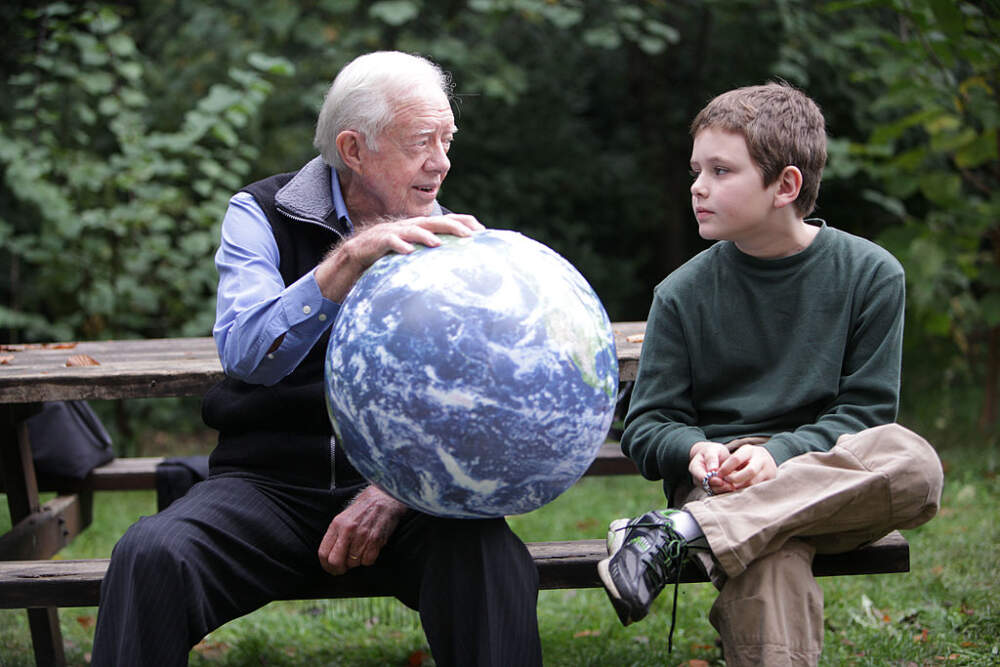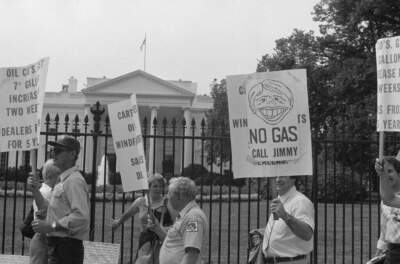Advertisement
Commentary
Jimmy Carter won my vote with his inspired idealism — he’d win it again

The first time I was old enough to vote in a presidential election, I voted for Jimmy Carter. My inchoate affinity for ecological causes must have found resonance in the quiet farmer from Plains, Georgia, who died at 100 years old this week.
Carter’s environmental record is celebrated. He promoted renewable energy, established a program to deal with hazardous waste sites and protected vast tracts of the Alaskan wilderness. The authenticity of his moral intuition to conserve nature is unquestioned.
But history has sometimes conflated that instinct with his drive to overcome the political adversity that attended his presidency. Some of the initiatives that undergird his environmental bona fides were, in fact, prompted by economic troubles and energy security concerns. And several of his policies were incongruous with his reputation as an environmentalist.
During his presidential run in 1976, Carter was asked how he would address clashes between economic growth and environmental quality. “I want to make it clear if there is ever a conflict, I will go for beauty, clean air, water and landscape,” he responded, which was consonant with his convictions about conservation while hinting at a naive idealism.

Within his first weeks in office, his priorities had shifted. The country was beset by high unemployment and inflated oil and gas prices stemming from multiple causes, most notably the ongoing fallout from the oil embargo that OPEC had imposed a few years earlier. President Carter made a nationally televised fireside address to plead for energy conservation.
The address focused on saving energy, but it made no reference to environmental issues. Carter was doggedly intent on cutting oil imports, and he felt conserving fuel and developing alternative energy sources were the best means to achieve that goal. Knock-on benefits of lower fuel consumption, such as reducing the nation’s air pollution, went unmentioned.
The alternative to oil that Carter had foremost in mind was coal — cheap and plentiful, but ecologically pernicious. In September 1979, Carter called on Congress to mandate the conversion of half of the nation’s oil-fired generation plants to coal. Had it been enacted, the plan would have led to increased surface mining and particulate pollution irreconcilable with Carter’s ostensible environmentalism.
Advertisement
A speech Carter gave at a new coal-fired power plant in Kentucky that same year exemplifies the strained rhetoric he needed to bridge the gap between environmental aspiration and the sooty technology he was endorsing. “We will also protect our environment,” he said while inveighing against the evils of OPEC and, in the next breath praising the plant, implausibly, for “burning high sulfur coal cleanly and safely.”
Is the memory of [Jimmy] Carter diminished because circumstances sometimes forced him to subordinate his impulse to protect the living world? I don’t think so.
Carter began phasing out Nixon’s oil price controls, and the ensuing price spike swiftly spurred production of domestic crude. Drilling, especially in Alaska’s ecologically sensitive Prudhoe Bay fields, rose precipitously during his term. Imports declined. The rationale of “energy independence” served to justify the environmental costs.
Famously, the former president had a solar hot water system installed on the roof of the White House, and his backing for solar power went well beyond mere symbolism. He advanced legislation and funding for research, tax credits and a bank dedicated to jumpstarting commercial and residential solar projects. He set a target to generate 20% of the nation’s electricity with renewable energy by 2000.
Would Carter have been so bullish on solar energy if cheap oil had been flowing as it did in the 1960s? Again, the record suggests that Carter’s support of renewables was less about averting environmental harm and more about supplanting imported oil. He remarked that the nation should harness “the power of the sun to enrich our lives as we move away from our crippling dependence on foreign oil.” And in his April 1977 "Address to the Nation on Energy", he said the need for solar energy was urgent “because we are now running out of gas and oil.”
But energy politics once again trumped ecosystem protection in 1980 during the controversy around the snail darter, an endangered fish under threat by the construction of the Tennessee Valley Authority’s Tellico Dam. Congress passed a bill that included a waiver of the Endangered Species Act to enable the dam to go forward, and Carter signed the bill into law.

And when Carter said in his November 1979 “Crisis of Confidence” speech (aka the “malaise” speech), “We will protect our environment. But when this nation critically needs a refinery or a pipeline, we will build it”, he acceded to the dominance of fossil fuels over environmental policy that has prevailed in the U.S. for a century.
By this point, his presidency was on the ropes, and Ronald Reagan defeated him easily a year later.
Jimmy Carter evinced the strong moral sensibilities that spring from humble origins and a Southern Baptist upbringing, and this ethical grounding influenced his outlook on the natural world. His reverence for the web of life, instilled growing up with his hands deep in the sandy loam of a Georgia farm, endured through his post-presidential years.
Is the memory of Carter diminished because circumstances sometimes forced him to subordinate his impulse to protect the living world? I don’t think so. His groundbreaking advocacy for solar energy and his lasting statutory accomplishments — the Department of Energy, the Superfund program, and the Alaska National Interest Land Act — outweigh his failures and secure his position among our most environmentally progressive presidents.
A leader able to keep his policies entirely consistent with his principles would be the rarest of exceptions. Carter’s abiding intimacy with the Earth served him as a lodestar, albeit an imperfect one. My 19-year-old self connected with his inspired idealism, and today, having seen the exemplary life he lived, my vote would be unchanged.
Follow Cognoscenti on Facebook and Instagram. And sign up for our weekly newsletter.
